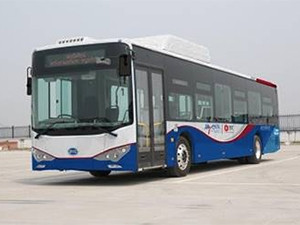
Plans by the City of Cape Town to reduce its carbon emissions are full steam ahead, as the city has announced it will roll out 10 electric buses for the MyCiTi service by next year June.
Earlier this year, mayor Patricia De Lille said as part of plans to expand the footprint of the MyCiTi bus service, Cape Town will purchase electric buses.
Launched in 2010, the MyCiTi bus service has recorded more than 53 million passenger journeys to date, with a more than 1.7 million trips for the month of September.
According to De Lille, rolling out the electric vehicles is part of a pilot project to evaluate the benefits of battery-powered electric buses as an alternative fuel option for the MyCiTi bus fleet, which is to grow significantly over the next decade.
"As we extend the footprint of the MyCiTi service across the city, we also have the responsibility to lower our carbon emissions and the impact of pollution on the urban environment.
"The procurement of the electric buses affirms our commitment made at COP21 in Paris, where I committed to ensure the City of Cape Town takes decisive action and pursues ambitious climate action projects that are not only beneficial to residents but most importantly, the environment."
She adds: "Our Energy2040 goals include a shift from private to public transport, with increased access to public transport, reduced travel time, and the use of more efficient vehicles with higher occupancy levels.
"Alternative fuel for public transport is no longer a choice, but a prerequisite."
Local is lekker
To achieve clean energy goals, the city awarded the tender for the procurement of battery-powered electric buses and ancillary equipment to the local arm of rechargeable battery and computer components firm, the BYD Company.
The contract, which is valued at R126 million, aims to benefit residents as the buses will be assembled locally and the bus bodies will in part be manufactured locally.
Included in the contract is the provision for the buses, ancillary equipment, services and training, according to De Lille.
She explains: "As a member of the C40 Cities, we have committed to working with other member cities to take action to address climate change and build low-carbon, resource-efficient cities.
"One of the exciting conditions of this contract is that the electric buses will be assembled locally in Blackheath and that the manufacture of the bus bodies is required to meet minimum local content and production values.
"The contractor will be employing local staff and will have to source some of the bus components from local suppliers."
The tender specifies the electric bus should be able to travel at least 250km in traffic before the batteries need recharging, she adds.
"Apart from the buses, BYD SA is required to provide the city with ancillary components such as the charging stations for the buses and data management systems, as well as provide spare parts, technical support and training for the bus drivers and mechanical staff, fleet maintenance services, and replacement of the energy storage system when required."
Share